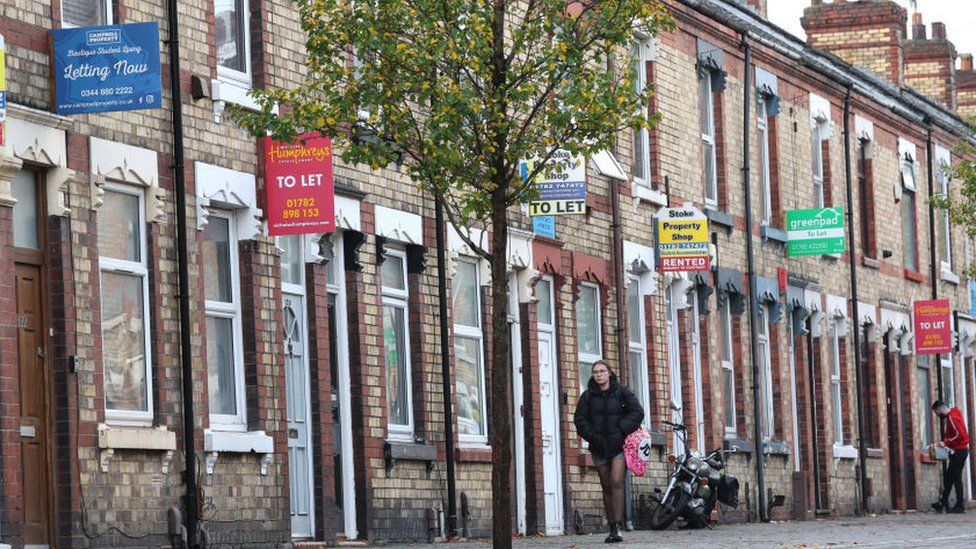ARTICLE AD BOX
 Image source, Getty Images
Image source, Getty Images
By Kevin Peachey
Cost of living correspondent
Rising interest rates are putting pressure on landlords, pushing some to consider selling up, surveyors say.
In turn, that could further squeeze the availability of rental properties and raise costs for tenants, according to the Royal Institution of Chartered Surveyors (RICS).
Some landlords are also considering their future due to proposals for a ban on no-fault evictions in England.
RICS said that "storm clouds have gathered" over the UK housing market.
Lenders predict the Bank of England will raise interest rates again because general price rises - as measured by inflation - are taking longer to slow down than previously anticipated.
That has raised mortgage costs higher than expected, not only for those buying a home and remortgaging, but also for landlords and those with a buy-to-let property.
The availability of homes to rent has already been squeezed, so higher costs - as well as the Renters Reform Bill - is likely to continue that trend, according to RICS, which represents surveyors.
Fewer homes to rent means demand continues to outstrip supply, which pushes up the rental prices for those properties that are available.
"Interest rate rises are also impacting the rental sector and combined with looming reforms proposed in the government's Renters (Reform) Bill, landlords are increasingly deciding to leave the sector and sell up property, causing further constraints to lettings supply," said RICS senior economist, Tarrant Parsons.
A proposed new law would abolish landlords' ability to evict tenants with no justification in England.
What is a no-fault eviction?
A key piece of housing legislation, known as Section 21, allows landlords to evict tenants without giving a reason.
After receiving a Section 21 notice, tenants have just two months before their landlord can apply for a court order to evict them.
Mortgage rates are rising for everyone, with analysts predicting this will slow the housing market, as buyers are either unable to secure a suitable mortgage, or choosing to wait for rates to drop.
Landlords, as property owners, face many of the same pressures, and would be affected by further expected rises in interest rates by the Bank of England.
"Reports from the agents read as increasingly desperate cries for help, as the imbalance in the market gets worse with each passing month," said Sarah Coles, head of personal finance at investment platform Hargreaves Lansdown.
That could increase rents if supply dries up.
"Given that rent absorbs a far bigger chunk of people's incomes than mortgages, these hikes will add insult to injury. It's going to make it even more difficult for renters to stay on top of their finances," Ms Coles said.
Difficulties in waiting
RICS said that the storm clouds had gathered with higher mortgage rates for all homeowners looking for a new fixed deal.
Brokers have warned that those who decide to try to ride out the current hikes and move to a standard variable rate for the time-being face particularly big increases.
"A wide range of people are stuck on these super-high standard variable rates, including older borrowers unable to refinance and homeowners who do not qualify for rate switches when their fixed deals end," said Aaron Strutt, of broker Trinity Financial.
"Some lenders have a much higher standard variable rate than others, we tell our clients how important it is to choose a lender that treats its customers fairly when their rates come to an end."
What are your renting rights?
- How much can my landlord increase the rent? It depends on your agreement but rises must be fair, realistic and in line with local properties and there's usually a month's notice.
- Can my landlord evict me? Landlords need to follow strict rules such as giving written notice. Once the notice period ends, the landlord can start eviction proceedings through court.
- Can a landlord refuse people on benefits? No. DSS policies are unlawful discrimination, says charity Shelter. Some councils have lists of private landlords who rent to tenants claiming benefits.
There's more on your renting rights and where to go for help here.

 1 year ago
66
1 year ago
66








 English (US) ·
English (US) ·